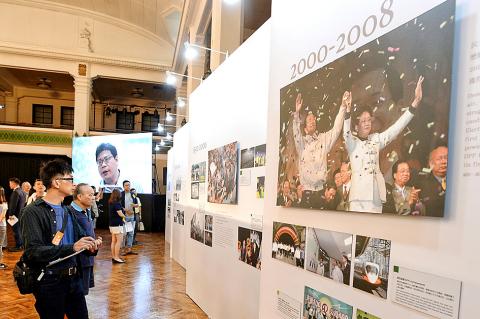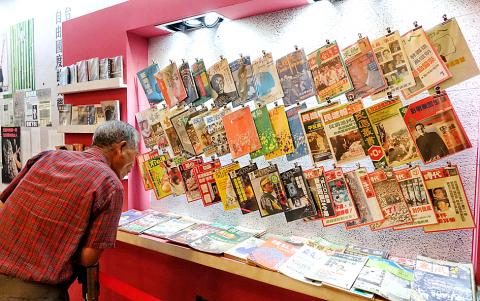Several Democratic Progressive Party (DPP) members said a discussion about the party’s core values is necessary as they called for a rescheduling of events marking the 30th anniversary of the DPP’s founding that were to take place at the Grand Hotel in Taipei on Wednesday, but were canceled due to Typhoon Megi.
On Sept. 28, 1986, 132 people took an oath at the Grand Hotel to found the DPP at a time when Taiwan was still under martial law and the establishment of new political parties was not allowed.
The DPP planned to hold an expanded meeting of its Central Standing Committee at the hotel, inviting all 18 members of the organizing committee to a reunion.

Photo: Lin Cheng-kun, Taipei Times
Hsu Jung-shu (許榮淑), one of the 18 who founded the party, on Wednesday said the DPP should consider the interests of Taiwanese and adopt a clear and definite cross-strait policy to avoid reacting passively to Beijing’s moves.
Hsu said the DPP “is no longer a rookie” and should “make contributions to Taiwanese,” as the party has won the reins of government for a second time and holds a legislative majority for the first time.
Although Taiwan has grown over the past three decades into a liberal democracy, the issue of national identity remains a point that has split the nation in a “unification versus independence” debate, Hsu said.

Photo: Lin Cheng-kun, Taipei Times
A captain “is obliged to inform her passengers where the ship is heading,” she said.
Some people envision Taiwan as an independent nation that does not bear the official name the Republic of China (ROC) and is not governed based on the 1947 Constitution, while those advocating “unification” see union with Beijing as a new entity — however that is defined, Hsu said, adding that the issue of unification versus independence should be discussed by all groups in the spirit of democracy, in the same way that the DPP debated its China policy in 1998 when Hsu Hsin-liang (許信良) was its chairman.
Hsu Jung-shu said that in 2008, she expected that the DPP would draft a cross-strait policy that was not as reliant on Beijing as the Chinese Nationalist Party’s (KMT) version, but at the same time would take care of the interests of Taiwanese.
She was expelled by the DPP in 2009 after she visited China in defiance of party policy and later founded the People Priority Party.
Former DPP legislator Lin Cho-shui (林濁水) said the DPP was the trailblazer of Taiwan’s major issues, ranging from independence, cultural autonomy, direct elections for the presidency and the “comprehensive electoral reform of the people’s representatives.”
“Comprehensive re-election of the people’s representatives” is a term referring to the general re-election of National Assembly members in 1991 and Legislative Yuan members in 1992, when members stepped down after being elected in areas formerly controlled by the ROC that became People’s Republic of China territory.
Lin said that the DPP did not realign itself with the agendas of social activists in 2013 and 2014, a failure that led to its “gradual marginalization, loss of direction, loss of core values and an inability to grasp current affairs or develop a vision for the future.”
“In spite of a majority support for changes to the Constitution, the DPP avoided the issue,” he said. “Is this entity still called the DPP? I find it unrecognizable.”
“There are those within the party who would sacrifice Taiwanese identity and consciousness to ingratiate themselves with China,” former national policy adviser and longtime DPP supporter Wu Li-pei (吳澧培) said. “I cannot abide that. Do not presume to think that the DPP is indispensable to Taiwan; if the DPP does not lead Taiwanese on the right path, political parties that are able and willing to defend Taiwan will rise and replace the DPP.”
Meanwhile, DPP spokesperson Ruan Jhao-hsyung (阮昭雄) said the issue of rescheduling anniversary events “needs internal discussion.”

A preclearance service to facilitate entry for people traveling to select airports in Japan would be available from Thursday next week to Feb. 25 at Taiwan Taoyuan International Airport, Taoyuan International Airport Corp (TIAC) said on Tuesday. The service was first made available to Taiwanese travelers throughout the winter vacation of 2024 and during the Lunar New Year holiday. In addition to flights to the Japanese cities of Hakodate, Asahikawa, Akita, Sendai, Niigata, Okayama, Takamatsu, Kumamoto and Kagoshima, the service would be available to travelers to Kobe and Oita. The service can be accessed by passengers of 15 flight routes operated by

Alain Robert, known as the "French Spider-Man," praised Alex Honnold as exceptionally well-prepared after the US climber completed a free solo ascent of Taipei 101 yesterday. Robert said Honnold's ascent of the 508m-tall skyscraper in just more than one-and-a-half hours without using safety ropes or equipment was a remarkable achievement. "This is my life," he said in an interview conducted in French, adding that he liked the feeling of being "on the edge of danger." The 63-year-old Frenchman climbed Taipei 101 using ropes in December 2004, taking about four hours to reach the top. On a one-to-10 scale of difficulty, Robert said Taipei 101

MORE FALL: An investigation into one of Xi’s key cronies, part of a broader ‘anti-corruption’ drive, indicates that he might have a deep distrust in the military, an expert said China’s latest military purge underscores systemic risks in its shift from collective leadership to sole rule under Chinese President Xi Jinping (習近平), and could disrupt its chain of command and military capabilities, a national security official said yesterday. If decisionmaking within the Chinese Communist Party has become “irrational” under one-man rule, the Taiwan Strait and the regional situation must be approached with extreme caution, given unforeseen risks, they added. The anonymous official made the remarks as China’s Central Military Commission Vice Chairman Zhang Youxia (張又俠) and Joint Staff Department Chief of Staff Liu Zhenli (劉振立) were reportedly being investigated for suspected “serious

Taiwanese and US defense groups are collaborating to introduce deployable, semi-autonomous manufacturing systems for drones and components in a boost to the nation’s supply chain resilience. Taiwan’s G-Tech Optroelectronics Corp subsidiary GTOC and the US’ Aerkomm Inc on Friday announced an agreement with fellow US-based Firestorm Lab to adopt the latter’s xCell, a technology featuring 3D printers fitted in 6.1m container units. The systems enable aerial platforms and parts to be produced in high volumes from dispersed nodes capable of rapid redeployment, to minimize the risk of enemy strikes and to meet field requirements, they said. Firestorm chief technology officer Ian Muceus said